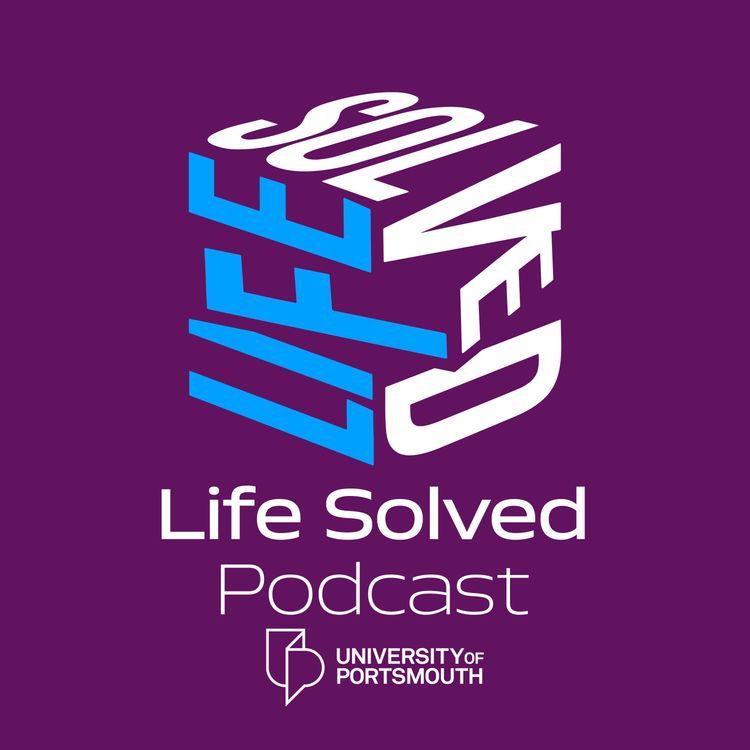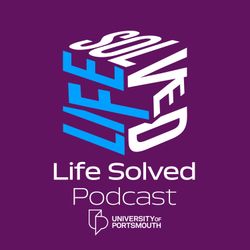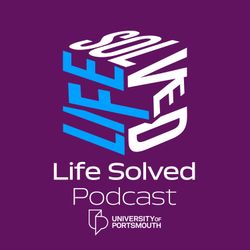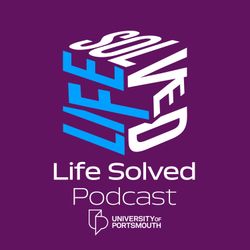Share

Life Solved
What happened during the fourth session of the Global Plastics Treaty?
This week Life Solved has a special one-off episode looking at INC-4. We unpack the fourth session of Global Plastics Treaty talks that recently took place in Canada - where global policymakers, charities, experts, and businesses sat down to work out how to end plastic pollution.
In her opening address, United Nations Environment Programme Chief, Inger Andersen, said to stop plastic pollution, we need to start at the start and end at the end. Sounds simple, but many fear these meetings create more barriers than solutions.
To give us a unique glimpse into what happens at these negotiations, we have three experts from the University of Portsmouth's Revolution Plastics Institute who were at INC-4 themselves.
We’d love you to be part of the discussion, too. Email your questions on this episode or ideas for future episodes to lifesolved@port.ac.uk.
If you’ve been inspired by this episode, and want to support our research then head to port.ac.uk/lifesolved to find out how.
You can also find out how to work or study with us.
USEFUL LINKS
Professor Steve Fletcher: https://www.port.ac.uk/about-us/structure-and-governance/our-people/our-staff/steve-fletcher
The world has a chance to end plastic pollution – the petrochemical giants mustn’t spoil it: https://www.theguardian.com/commentisfree/2024/apr/29/world-plastic-pollution-petrochemical-giants-un-treaty-2015-paris-lobbyists
Dr Cressida Bowyer: https://researchportal.port.ac.uk/en/persons/cressida-bowyer
Dr Erika Hughes: https://researchportal.port.ac.uk/en/persons/erika-hughes
Revolution Plastics: https://www.port.ac.uk/news-events-and-blogs/events/the-revolution-continues
More episodes
View all episodes

5. How women's clothing choices in Iran predicted the revolution years before it happened
16:49||Season 15, Ep. 5What if I told you the Iranian revolution was predictable - and the clues were in what women were wearing?As we approach International Women’s Day, Life Solved welcomes back a past guest, Dr Mahsa Gaffari, a specialist in marketing at the University of Portsmouth, whose research suggests consumption acts as a "crystal ball of society".In 2023, Dr Gaffari explained how dress codes and shopping choices allow women to subtly subvert state oppression through clothing and consumer choices in Iran.Two years on, a new wave of mass protests have erupted in the country, making international headlines due to the level of violence. In this episode we unpack the signals that indicated political change was on the horizon.Production team:Robyn Austin-MontagueLauren HarrisonMusic: Exiled by PhilLarsonLearn more links:Dr Mahsa GhaffariIran protests are not just about economics – they’re a full-blown ideological crisisExploiting institutional plasticity in Iranian advertising
4. Plastic Politics: What happens if the Global Plastics Treaty fails?
27:14||Season 15, Ep. 4Countries are negotiating a Global Plastics Treaty to unite nations against plastic pollution, but progress has been significantly delayed.The process is under scrutiny, the Chair has recently stepped down, and while the next round of talks (INC-5.3) is scheduled for February 2026, the future of the treaty remains uncertain. Even if consensus is achieved, ratification could take years. So what happens in the meantime? In this episode, we explore how governments, businesses, and civil society can maintain momentum without a treaty, and whether the UK can seize a leadership role. Speaking to Dr Antaya March from the University of Portsmouth’s Global Plastics Policy Centre, we uncover practical steps, innovative policies, and grassroots actions that could make a difference now.Production team:Robyn Austin-MontagueCaroline MeechMusic:Ambient Emotional Cinematic by ColourFilmMusicLearn more links:Global Plastics Policy CentreScientists urge governments not to wait for global plastics treaty as pollution continues to grow | University of PortsmouthLeaders gather at UK Parliament to strengthen national and global action on plastic pollution | University of Portsmouth Revolution Plastics Institute | University of Portsmouth
3. The secret social lives of primates: What chimps and monkeys reveal about human nature
25:09||Season 15, Ep. 3How similar are we to our closest living relatives? Closer than you might think - and the latest research is revealing just how much we share with chimpanzees and monkeys.In this episode of Life Solved, we speak to two experts from the University of Portsmouth's Centre for Comparative and Evolutionary Psychology, who are passionate about the deep evolutionary roots of human intelligence.Dr Esther Herrmann and Dr Marine Joly explain how studying our closest evolutionary cousins helps us understand what makes us human, why complex social groups drive cognitive evolution, and what our responsibility is to protect these remarkable, intelligent creatures.Production team:Robyn Austin-MontagueLauren HarrisonJaelithe SwanMusic:Music bed by Korolkov ProductionWildlife sounds captured by Dr Jerome MichelettaLearn more links:Centre for Comparative and Evolutionary Psychology | University of PortsmouthDr Esther Herrmann's chimpanzee rationality studyDr Marine Joly's macaque impulse control researchScience is Wonderful EU EventMany Primates Project
2. The power of Fighting with Pride to make change happen
24:49||Season 15, Ep. 2In this episode we chat to Craig Jones MBE, founder of the charity Fighting with Pride, a University of Portsmouth alumnus, and a recent honorary graduate recipient.The Royal Navy veteran’s story is one of resilience, transformation and advocacy; from serving in silence under a ban on LGBTQ+ people in the armed forces, to starting a charity that’s changed lives and policy in the UK.It serves as a powerful reminder of what courage and commitment can achieve.Production team:Raechelle JacksonRobyn Austin-MontagueMusic:Calm Inspiring by trickytwoaudioInspiring Corporate by Ultra_MusicUpbeat and Inspiring Corporate by WavebeatsMusicLearn more links:Fighting With Pride | RAF Benevolent FundAlumni spotlight | University of PortsmouthCraig Jones MBE | University of PortsmouthHonorary Degree Awards Nominations | University of Portsmouth
1. The R;pple effect: How personal loss led to life-saving tech
20:27||Season 15, Ep. 1In the first episode of Series 15 we meet Alice Hendy MBE, CEO and founder of R;pple Suicide Prevention and a recent University of Portsmouth honorary graduate.Alice set up the charity from scratch after losing her brother to suicide in November 2020. Drawing on her cybersecurity background, she created R;pple - an innovative digital tool that intercepts harmful online searches and guides individuals to free mental health support.This episode explores how personal experience can drive innovation, the power of refusing to accept that things cannot be better, and how one person's determination to prevent other families from experiencing their loss has created a global safety net for those in crisis.Content note: This episode deals with suicide and may not be suitable for all listeners. Support resources are available here: Get Support | Helplines and Resources | R;ppleProduction team:Robyn Austin-MontagueLauren HarrisonMusic:Emotional and Uplifting by bdProductionsLearn more:R;pple: Crisis Intervention | Suicide Prevention & Mental HealthAlumni spotlight | University of PortsmouthAlice Hendy MBE | University of PortsmouthHonorary Degree Awards Nominations | University of Portsmouth
6. Life onboard a ship in the Southern Ocean for science
20:43||Season 14, Ep. 6In this episode we chat to two researchers who travelled to one of the most remote inhospitable regions on the planet, in the pursuit of science.Professor Fay Couceiro and Dr Clare Boston from the University of Portsmouth travelled 7,000 nautical miles onboard a Royal Navy ship during its annual trip to the frozen continent of Antarctica. We find out why they were there, what they saw, and what life at sea is really like. We’d love you to be part of the discussion, too. Email your questions on this episode or ideas for future episodes to lifesolved@port.ac.uk.If you’ve been inspired by this episode, and want to support our research then head to port.ac.uk/lifesolved to find out how. You can also find out how to work or study with us.Life Solved is released on Thursdays and available on all major podcast platforms.Host: John WorseyProducer: Robyn Montague Sub Editors: John Worsey and Glenn HarrisUSEFUL LINKSProfessor Fay Couceiro bio: www.port.ac.uk/about-us/structure-and-governance/our-people/our-staff/fay-couceiroDr Clare Boston bio:www.port.ac.uk/about-us/structure-and-governance/our-people/our-staff/clare-bostonAntarctica tales with Professor Fay Couceiro: www.youtube.com/watch?v=1gMbbN6LWR8Revolution Plastics Institute:www.port.ac.uk/research/research-groups-and-centres/revolution-plastics-instituteProtector completes Antarctic mission: www.royalnavy.mod.uk/news-and-latest-activity/news/2024/march/08/240308-protector-completes-antarctic-missionRoyal Navy supports science mission into human impact on Antarctica: www.royalnavy.mod.uk/news-and-latest-activity/news/2023/december/05/20231205-royal-navy-supports-science-mission-into-human-impact-on-antarcticaAntarctic Treaty: www.ats.aq/index_e.html
5. Will architecture save the world?
18:11||Season 14, Ep. 5Instead of keeping nature out, architects around the world are looking at innovative ways to work with environments to help reduce the planet’s carbon footprint.To mark World Earth Day (April 22), this episode explores the transformative power of design and the impact of architecture on building a safe and sustainable future.We’re joined by Dr Phevos Kallitsis, Associate Head of the Portsmouth School of Architecture, and Dr Antonino Di Raimo is a Reader in Architecture at the University of Portsmouth.We’d love you to be part of the discussion, too. Email your questions on this episode or ideas for future episodes to lifesolved@port.ac.uk.If you’ve been inspired by this episode, and want to support our research then head to port.ac.uk/lifesolved to find out how.You can also find out how to work or study with us.Life Solved is released on Thursdays and available on all major podcast platforms.Host: Robyn MontagueProducer: Robyn Montague Sub Editors: John Worsey and Glenn HarrisUSEFUL LINKSDr Phevos Kallitsis bio: www.port.ac.uk/about-us/structure-and-governance/our-people/our-staff/phevos-kallitsisDr Antonino Di Raimo bio: www.port.ac.uk/about-us/structure-and-governance/our-people/our-staff/antonino-di-raimoWorld Earth Day: www.earthday.org/earth-day-2024/Portsmouth School of Architecture: www.port.ac.uk/about-us/structure-and-governance/organisational-structure/our-academic-structure/faculty-of-creative-and-cultural-industries/school-of-architecture
4. The unstoppable evolution of the English language
25:09||Season 14, Ep. 4To mark UN English Language Day (23 April), we consider how English became one of the world’s most widely spoken languages. And we find out how a mathematical model developed at the University of Portsmouth might predict its future. Dr Mario Saraceni, Associate Professor in English Language and Linguistics, explains how English spread and changed around the globe, and why speakers overseas influence how it’s spoken here in the UK.Dr James Burridge, Associate Professor in Probability and Statistical Physics, reveals how principles of physics and maths help him forecast how certain dialects of English will sound in the year 2066.We’d love you to be part of the discussion, too. Email your questions on this episode or ideas for future episodes to lifesolved@port.ac.uk.If you’ve been inspired by this episode, and want to support our research then head to port.ac.uk/lifesolved to find out how. You can also find out how to work or study with us.Life Solved is released on Thursdays and available on all major podcast platforms.Host: John WorseyProducer: Robyn Montague Sub Editors: Robyn Montague and Glenn HarrisUSEFUL LINKSDr Mario Saraceni bio: www.port.ac.uk/about-us/structure-and-governance/our-people/our-staff/mario-saraceniDr James Burridge bio: www.port.ac.uk/about-us/structure-and-governance/our-people/our-staff/james-burridgeThe problem with English: https://aeon.co/essays/how-do-you-decolonise-the-english-languageEy up northern English to become as lost as the hoddy dod:www.port.ac.uk/news-events-and-blogs/news/ey-up-northern-english-to-become-as-lost-as-the-hoddy-dodUN English Language Day:www.un.org/en/observances/english-language-day